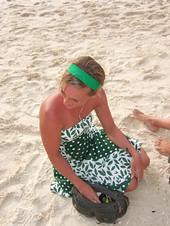Global Shark Assessment

Divers: You have very valuable experience and information that can be put to good use in scientific surveys. Many of you may know that the number of Marine Protected Areas and no-take zones have increased dramatically in recent years, so we need new methods (alternatives to fishing) to determine how species are responding to protection.
Why is this important?
Sharks are an essential component of marine ecosystems; yet, human pressure has put many species at dangerously low abundance levels. Determining what tools (e.g. Marine Protected Areas, coastal development, undisturbed nurseries, fishing regulations, etc.) are best for their survival will be essential for restoring, at least in part, these systems to their former resilience.

Project Description:
A group of researchers including Christine Ward-Paige are part of a working group that is conducting a Global Shark Assessment to evaluate how shark populations have changed since the beginning of industrial scale fishing, and to make predictions about how these populations will respond to global climate change and to different methods of fishing and protection.
Specifically, they are using scuba diver's observations to census shark populations at different spatial and temporal scales via two surveys: Historical Sightings Survey (HSS) and Current Sightings Survey (CSS).
The study will not only provide valuable information about where sharks are surviving, but it will also show that scuba divers can provide valuable information that is comparable to that provided by fishermen or volunteers in the Breeding Bird Survey.
WHY would you want to fill out a survey?
With overwhelming evidence that shark populations have declined dramatically over the last 50 years, there are still places where some shark species are persisting and even thought to be thriving. Identification of these species and areas is an important step in determining the best method for recovery. In a time when the number of no-take zones and fishing restrictions are increasing, there is a need for acquiring data through alternative, non-extractive methods. All scuba divers/snorkelers that have been in the ocean can help with this effort.
WHO can help?
ANYONE that has ever dived/snorkeled in the ocean! There are two surveys: Historical Sightings Survey (HSS) and the Current Sightings Survey (CSS). Ideal candidates for the HSS are dive professionals or recreational divers. Since preliminary interviews suggested that most dive professionals do not keep logbooks, the survey asks divers to report their sightings and effort from memory. Preliminary research suggested that divers could recall the level of detail being asked in the HSS with reasonable accuracy; however, divers that do have logbooks are being encouraged to fill out the survey from memory and then with the logbook to get an estimate of error.
CSS gets divers to report sightings (or no sightings) for each dive. This survey is more specific and detailed than the HSS. All ocean going divers (professionals, recreational, and tourists) are candidates for this survey. CSS is not to be filled out from memory, it is for dives that you have environmental and sightings information for (either you have just done this dive or it is recorded in a logbook)- again it must include dives where you did and did not see sharks.
HOW to help?
1) Fill out the online survey- it should ONLY take a few minutes (1-2 minutes per area) by clicking on the logo above, OR 2) Send Christine an email (globalshark@gmail.com) and she'll send you an excel survey. THEN forward this survey to as many divers or dive shops that you can- the more people that fill out this survey the more we will know about the sharks people see.






0 Comments:
Post a Comment
Subscribe to Post Comments [Atom]
<< Home